Humans are social beings and as much as we want to socialize with our human connections, we also socialize with animals. Some animals are more social than others and we can say that every domesticated animal is quite social. Most animals live in a herd and they are used to social behavior.
Guinea pigs are social animals. They like to socialize with humans just like any cat or dog. It takes just a couple of weeks for guinea pigs to develop affection toward the owner. After a few months, their trust and social behavior towards the owner start to flourish.
Table of Content
How Is the Guinea Pig’s Social Life?
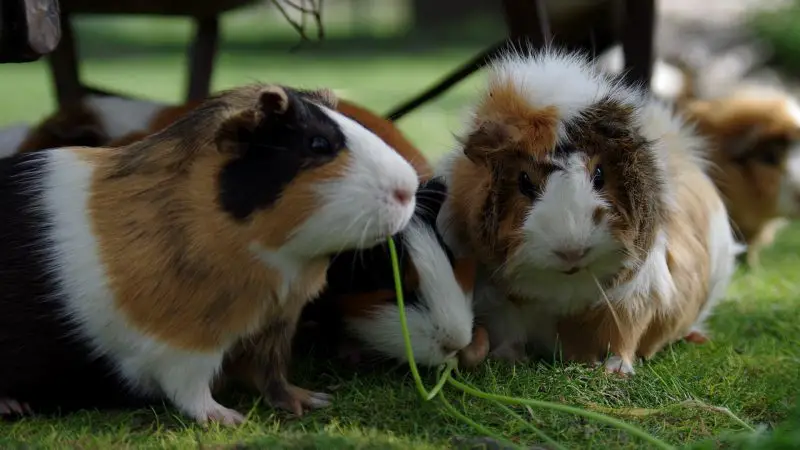
Guinea pigs communicate with each other with their sensitive nose and sharp ears. They also make sounds to interact with others. In the absence of a companion, these skills can get lost. As a pet owner, you should keep a guinea pig in pairs or groups if you want to enjoy hearing happy guinea pig sounds.
Usually, pet owners become obsessed with getting the attention of guinea pigs. Guinea pigs are responsive, but they are different from dogs or cats. Guinea pigs do not act according to your whims.
The sooner you realize that, the better it is for both the guinea pig and you. They will gradually befriend you, but you will have to give them time and another guinea friend to talk to.
Domestication has been part of human life since a long ago. Guinea pigs have been long known for domestication and at first, they have been used by humans as food. They became popular as a pet when Queen Elizabeth kept guinea pigs as her favorite pet.
Low Levels of Social Aggression in Guinea Pigs
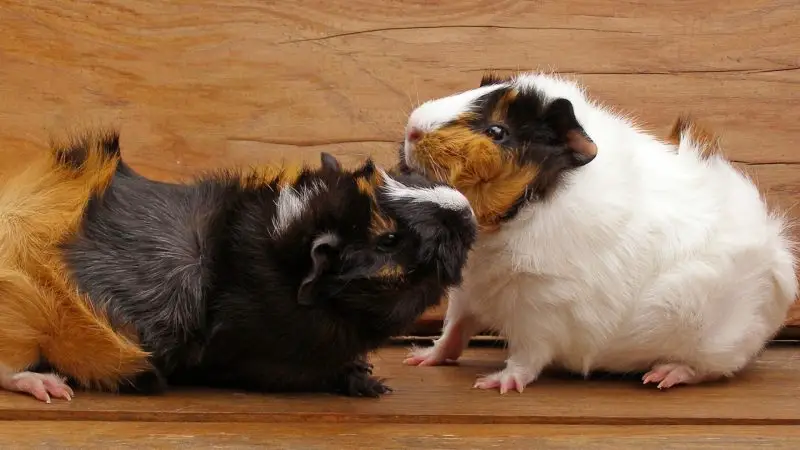
Do Guinea Pigs Fight?
Guinea pigs fight with each other. Then eventually, they settle down their fight like grown-up intelligent people which shows their constant need to socialize.
Male guinea pigs love to seduce female guinea pigs and also fight with their competition for getting the attention of the female guinea pig. In case, your guinea pigs are fighting a little bit too much, you can always separate them into different cages or make a wall of grids inside the big cage.
Some behavioral characteristics they show while seducing are rumble strutting, butt sniffing, butt nudging, chasing, butt dragging, mounting nose faceoffs, teeth chattering, and raised hackles.
Are Guinea Pigs Dominant?
Guinea pigs not only fight for female guinea pigs’ attention but they also fight for supremacy in the herd. This can happen between male/male or male/female or female/female guinea pigs. If the fight is getting extreme, it is better to separate them.
The chances are that your guinea pigs will never get along with each other and you should be prepared for it. But, this nature is also part of socialization. Fighting is a social character. Some of the features that they exhibit while they want to show their dominance are teeth chattering, nips, wide yawns to show off their teeth, and snorting.
When the fighting gets extreme, they show behavior like bite attacks, raised hackles with loud, angry teeth chattering, and rumble strutting. Sometimes, both guinea pigs will raise up face to face on their haunches, which will finally lead to the full battle.
Females try to avoid confrontation with each other when they are trying to get a mate but they can also be aggressive. After they are done mating, they go back to being normal. It’s like two friends trying to hide something from each other.
The social behavior of showing dominance is common in both male and female guinea pigs. If there is only one source of food, water, or even a potential mate, the dominant will definitely try to bully others.
Guinea pigs are quite picky with their food and show childlike behavior if you don’t feed them the food of their interest. They will even go to the length of starving themselves to death to force you to give them what they want.
Reasons Why Guinea Pigs Are Socially Active Animals
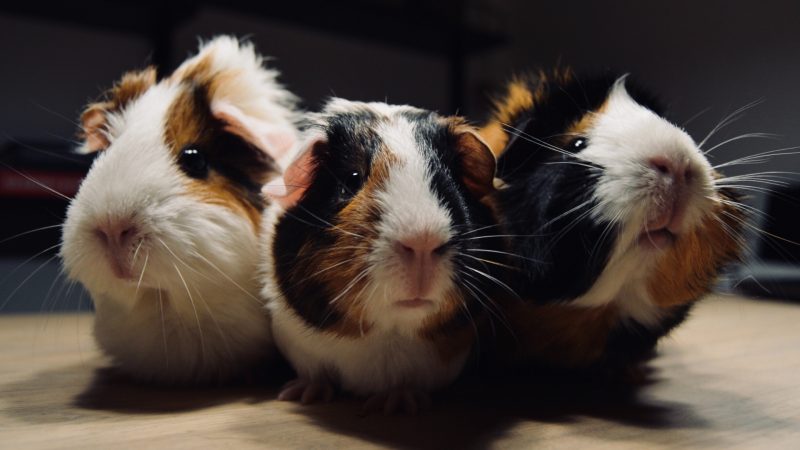
Do Guinea Pigs Like to Communicate?
Guinea pigs are very communicative animals. They produce so many different sounds. Guinea pigs love to be vocal when they want to communicate their happiness, excitement, or even sadness to others. They chatter with their teeth, squeak, wheek, and chirp. Don’t be disheartened if they don’t do it.
Like us humans, some guinea pigs are extroverts while some like to keep things low and don’t want to talk at all. It does not mean that those guinea pigs are not social. It means that they all have different personalities. Their behavior and their voices can tell you what they are trying to say to you.
There is no set timetable for their sounds or chattering. They can do that during the day or even at night. Guinea pigs are most excited when they are fed with fresh veggies or hay or when they are communicating with their companion.
So, if you want to witness their chatter, you have to keep an eye on them and feed them lavishly. Guinea pigs also respond to noises that they don’t like. This could be loud music in your house, the sound of a keychain, wind chimes hanging at your door, doorbells, the ringtone of your phone, etc.
When in herds, guinea pigs maintain a social hierarchy. This enables them to avoid unnecessary fights. In fact, research has shown that guinea pigs thrive better in herds than in single units or even in pairs.
Are Guinea Pigs Depressive?
Often, when one guinea pig dies, the other will suffer from depression and might refuse to eat, which in the end can also lead to starvation. Guinea pigs make chirping sounds indicating that they miss their friend. In that case, you should try to introduce a new guinea pig to them.
You should spend more time with your guinea pig and try to make it happy by offering it its favorite food. They will come around for sure. This shows just how social a guinea pig can be!
Guinea Pigs and Their Need for Personal Space
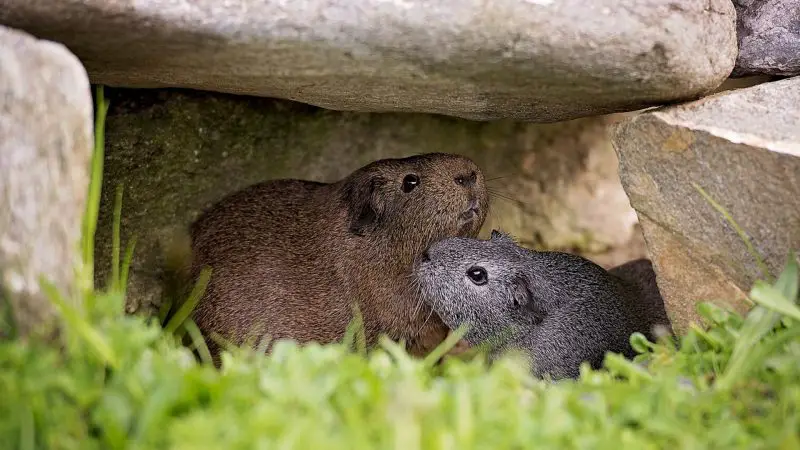
Generally, guinea pigs are popular as a pet for their gentle and affectionate nature. They respond well to gentle handling but do not require as much attention as other pets, such as a dog or a cat.
Guinea pigs love to spend some ‘lap time’ with the owner due to their social nature. They love to play and have someone to talk to. Guinea pigs are rarely hostile but they love to have some personal space. You, as the owner, need to understand when the guinea pig wants to quit cuddling and playing.
Though guinea pigs can settle with anybody, it is better to keep them with their own species to avoid any clash, especially the animals which are stronger than guinea pigs. Animals like dogs and cats are carnivores and can harm your guinea pig in your absence even if you have trained them enough.
Even less aggressive animals, like rabbits or hamsters, can bully your guinea pig, which will aggravate their stress. Guinea pigs go well with humans because we do not try to harm them and we only show them affection.
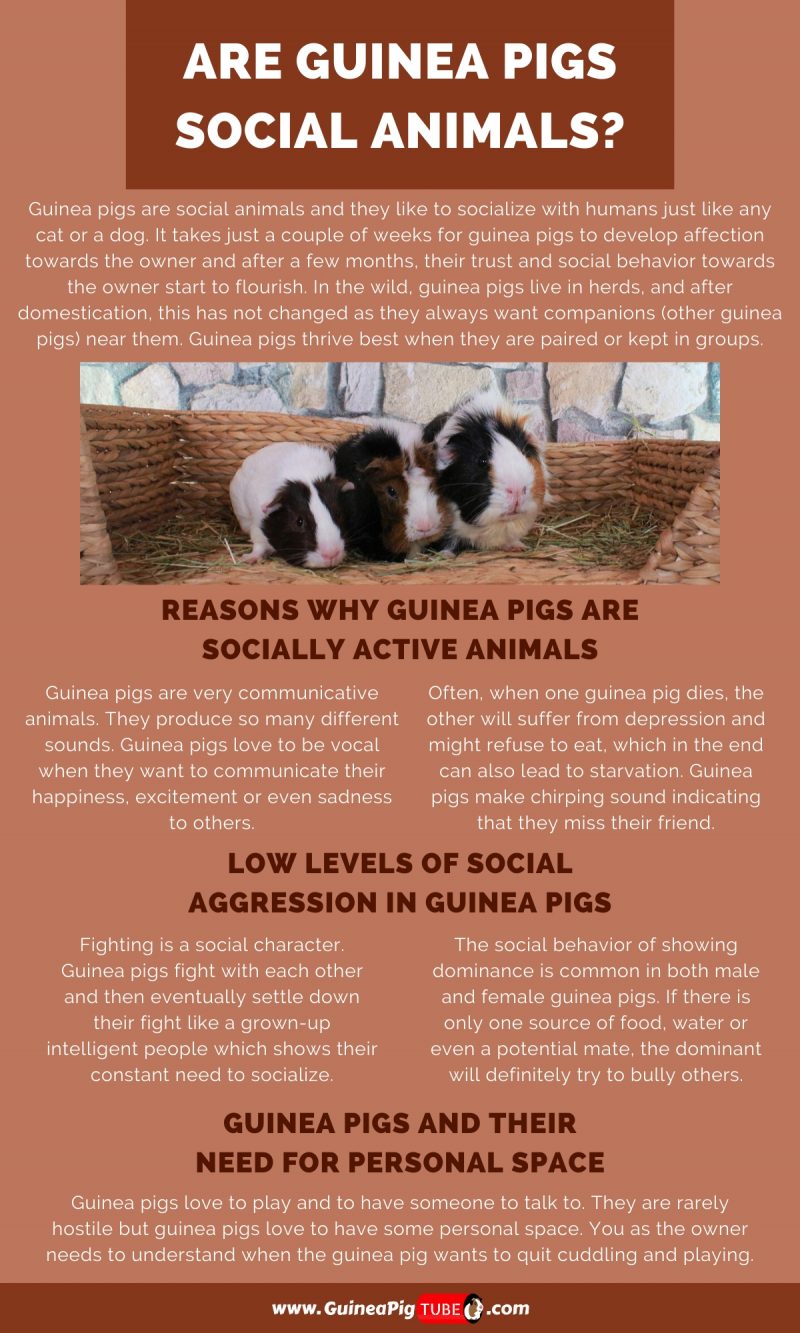
Guinea pigs are social animals and easy to domesticate. It is okay if your guinea pig hides away at the first sight of your guest who you might want to show your pet animal. It is their basic instinct to find a safe place if they see any danger.
Stay and watch them from a safe distance and enjoy their way of life. If they are active with you, just be happy and appreciate your pet guinea pig. Best of luck!
List of Sources
Of Domestic and Wild Guinea Pigs: Studies in Sociophysiology, Domestication, and Social Evolution
Group Selection and Social Evolution in Domesticated Animals
Social Experience, Behavior, and Stress in Guinea Pigs
Social Confrontation in Male Guinea Pigs: Behavior, Experience, and Complement Activity
The Effects of Isolation From Birth of the Social Behaviour of Guinea Pigs in Adulthood
